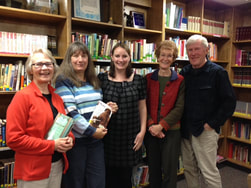
The Book Club meets on the first Monday of each month at 9:30 am. Whenever possible, the book group has these books available in the library; look for the books with a yellow dot on the spine. To check out a book, put your name on the card in the back of the book and place it in the box on the shelf. Return the book when you are finished so that others may read it before the next meeting.
For TLC Book Group Schedule 2022 click HERE
For TLC Book Group Schedule 2022 click HERE